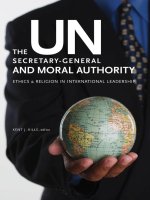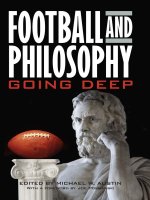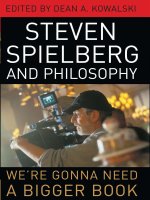university press of kentucky steven spielberg and philosophy were gonna need a bigger book nov 2008
Bạn đang xem bản rút gọn của tài liệu. Xem và tải ngay bản đầy đủ của tài liệu tại đây (1.78 MB, 284 trang )
STEVEN SPIELBERG
AND PHILOSOPHY
e Philosophy of Popular Culture
e books published in the Philosophy of Popular Culture series will illu-
minate and explore philosophical themes and ideas that occur in popular
culture. e goal of this series is to demonstrate how philosophical inquiry
has been reinvigorated by increased scholarly interest in the intersection of
popular culture and philosophy, as well as to explore through philosophical
analysis beloved modes of entertainment, such as movies, TV shows, and
music. Philosophical concepts will be made accessible to the general reader
through examples in popular culture. is series seeks to publish both es-
tablished and emerging scholars who will engage a major area of popular
culture for philosophical interpretation and examine the philosophical
underpinnings of its themes. Eschewing ephemeral trends of philosophi-
cal and cultural theory, authors will establish and elaborate on connections
between traditional philosophical ideas from important thinkers and the
ever-expanding world of popular culture.
SERIES EDITOR
Mark T. Conard, Marymount Manhattan College, NY
BOOKS IN THE SERIES
e Philosophy of Stanley Kubrick, edited by Jerold J. Abrams
Football and Philosophy, edited by Michael W. Austin
e Philosophy of the Coen Brothers, edited by Mark T. Conard
e Philosophy of Film Noir (paperback edition), edited by Mark T. Conard
e Philosophy of Martin Scorsese, edited by Mark T. Conard
e Philosophy of Neo-Noir, edited by Mark T. Conard
e Philosophy of e X-Files, edited by Dean A. Kowalski
e Philosophy of Science Fiction Film, edited by Steven M. Sanders
e Philosophy of TV Noir, edited by Steven M. Sanders and Aeon J. Skoble
Basketball and Philosophy, edited by Jerry L. Walls and Gregory Bassham
STEVEN
SPIELBERG
AND
PHILOSOPHY
Edited by Dean A. Kowalski
The University Press of Kentucky
WE’RE GONNA NEED
A BIGGER BOOK
Copyright © 2008 by e University Press of Kentucky
Scholarly publisher for the Commonwealth,
serving Bellarmine University, Berea College, Centre
College of Kentucky, Eastern Kentucky University,
e Filson Historical Society, Georgetown College,
Kentucky Historical Society, Kentucky State University,
Morehead State University, Murray State University,
Northern Kentucky University, Transylvania University,
University of Kentucky, University of Louisville,
and Western Kentucky University.
All rights reserved.
Editorial and Sales Offices: e University Press of Kentucky
663 South Limestone Street, Lexington, Kentucky 40508-4008
www.kentuckypress.com
12 11 10 09 08 5 4 3 2 1
Library of Congress Cataloging-in-Publication Data
Steven Spielberg and philosophy : we’re gonna need a bigger book /
edited by Dean A. Kowalski.
p. cm. — (e philosophy of popular culture)
Includes bibliographical references and index.
ISBN 978-0-8131-2527-5 (hardcover : alk. paper)
1. Spielberg, Steven, 1946—Criticism and interpretation. 2. Motion
pictures—Moral and ethical aspects. I. Kowalski, Dean A.
PN1998.3.S65S84 2008
791.4302'33092—dc22
2008026318
is book is printed on acid-free recycled paper meeting
the requirements of the American National Standard
for Permanence in Paper for Printed Library Materials.
Manufactured in the United States of America.
Member of the Association of
American University Presses
Contents
Acknowledgments vii
Introduction 1
Dean A. Kowalski
Part I: Philosophy, the Filmmaker, and the Human Condition
e “Big-Little” Film and Philosophy: Two Takes on Spielbergian
Innocence 7
Gary Arms and omas Riley
e Recovery of Childhood and the Search for the Absent Father 38
Michel Le Gall and Charles Taliaferro
Levinasian Ethics of Alterity: e Face of the Other in Spielberg’s
Cinematic Language 50
John W. Wright
e Paradox of Fictional Belief and Its Moral Implications in Jaws 69
Christopher R. Trogan and Dean A. Kowalski
A.I.: Artificial Intelligence and the Tragic Sense of Life 82
Timothy Dunn
Part II: Values, Virtue, and Justice
What Is Wrong with Cloning a Dinosaur? Jurassic Park and Nature as
a Source of Moral Authority 97
James H. Spence
Is Oskar Schindler a Good Man? 112
Roger P. Ebertz
vi Contents
A Spielbergian Ethics of the Family in Saving Private Ryan and
e Color Purple 129
Robert R. Clewis
Human Rights, Human Nature, and Amistad 150
David Baggett and Mark W. Foreman
Terrorism, Counterterrorism, and “e Story of What Happens Next”
in Munich 170
Joseph J. Foy
Part III: Realism, Mind, and Metaphysics
Spielberg and Cinematic Realism 191
Keith Dromm
A.I.: Artificial Intelligence: Artistic Indulgence or Advanced
Inquiry? 210
V. Alan White
Minority Report, Molinism, and the Viability of Precrime 227
Dean A. Kowalski
Appendix: Discussing Five Spielberg Films 248
Contributors 267
Index 271
I remain indebted to Mark Conard, Steve Wrinn, and (especially) Anne Dean
Watkins at the University Press of Kentucky. ey, and all of their colleagues
at UPK, remain unsurpassed in their dedication and loyalty to their authors.
While I am grateful for the quality efforts of all the contributing authors, I
owe a tremendous debt of thanks to Professor Joseph Foy. I have no finer
colleague than he. My wife, Patricia, continues to be a constant source of
strength and encouragement. My parents, Bruce and Susan, remain subtle
stalwarts of support.
I have been incorporating film and television in my classroom for more
than a decade. My students have always appreciated this; indeed, many
subsequently inspired me to commit fully to this way of teaching philoso-
phy. at inspiration now culminates in the fruition of this book. I thus
dedicate this book to my students. I recall philosophy majors and minors
from Dubuque and Indianapolis: C. Ashton, E. Bader, W. D. Bentley, E.
Comstock, A. Fisher, S. Franks, K. Fry, A. Giese, V. Grider, J. Haire, E. Huff,
W. E. Koron, S. Kutsch, T. Lazzaro, C. Neblett, K. Perhach, E. Phillips, K.
Storey, S. Takacs, and K. Zeilenga. More recently, and at the risk of offending
some, I note: J. Boeck, M. Carrillo, E. Colvin, K. Ellis, J. Gorman, L. Hlaban,
M. Kleppe, D. Koller, D. Krause, S. Krause, C. Majdoch, L. Q. McDonald, B.
Mikulice, E. Mosely, D. Myszewski, S. Pfenninger, B. Retzlaff, J. Schroeder,
and C. Vouga. Space constraints do not allow me to continue. However, if
you remember and appreciate the term “phledgling philosopher,” then this
book is dedicated to you.
“For ‘Phledgling Philosophers’ Everywhere”
Ack nowledgments
vii
1
No film director has had more impact on popular culture than Steven Spiel-
berg. is volume acknowledges that fact. In its pages, you will find thirty
years of Spielberg’s directorial efforts explored and assessed through the
lens of philosophy. What you will also find (surprisingly, perhaps) is that
philosophy is not so much something that you “have” as something that
you “do.” Within each essay, the contributing authors discuss philosophical
issues—“doing” philosophy—in metaphysics (the study of ultimate reality),
epistemology (the study of knowledge), ethics (the study of right living),
axiology (the study of value, of which ethics is one facet), aesthetics (the
study of art and beauty), political philosophy, feminism, and mind, among
other areas. Because we are teachers as well as scholars, each essay is written
for those new to philosophy; thus, the discussions invariably presuppose
very little philosophy background.
e first section, “Philosophy, the Filmmaker, and the Human Condi-
tion,” contains five essays. Gary Arms and omas Riley provide a proper
introduction to the book. Arms pens part I of the essay, providing an analysis
of Spielberg’s literary choices, and focusing particularly on War of the Worlds
(2005) and Minority Report (2002). In the process, Arms provides us some
insights into Spielberg’s approach to filmmaking. Riley authors part II of
the essay, signaling the turn to philosophical exploration of Spielberg. Riley
focuses on ethical issues in Spielberg’s films, especially War of the Worlds
and Empire of the Sun (1987). He spells out how philosophical analysis is
importantly distinct from other sorts of analysis: philosophers attempt to
establish conclusions about nonempirical or conceptual matters via (ob-
jective) reasoning and logical argumentation. Michel Le Gall and Charles
Taliaferro provide insights into the Indiana Jones movies (1981, 1984, 1989),
Introduction
Dean A. Kowalski
2 Dean A. Kowalski
E.T. (1982), and Hook (1991) via the history of philosophy, and in particular
Plato and Socrates. No other discipline relies so heavily on its history as
does philosophy. In fact, studying the history of philosophy is another way
of “doing” philosophy. By knowing what the greats of philosophy concluded
about a topic we “stand on the shoulders of giants” so as to better see our
own philosophical surroundings. Le Gall and Taliaferro therefore invite you
to explore some of Plato’s texts, including the Republic, Euthyphro, and Crito.
ere is no better start to learning the history of philosophy.
ese two essays should prove to be excellent preparation for the re-
maining essays. e third and fourth essays of the section provide aesthetic
assessments of Spielberg’s films. ey should be of particular interest to
film scholars and philosophers of film. John Wright introduces us to Em-
manuel Levinas’s idea of the “other” and explains how Spielberg attempted
to capture this idea in his films, especially Close Encounters (1977), E.T.,
and Schindler’s List (1993). Christopher Trogan and I revisit Spielberg’s
first “summer blockbuster,” Jaws (1975). We draw out its vivid connections
to the issue of whether our emotional responses to fiction are rationally
defensible. Tim Dunn closes part I with an analysis of A.I. (2001) as a
commentary on the meaning of life. He parts with many critics of the film,
arguing that Spielberg’s rendering of what was originally Kubrick’s project
is underappreciated. Dunn believes that A.I. offers powerful—and perhaps
tragic—insights into the human condition.
e second section, “Values, Virtue, and Justice,” explores some of the
more significant ethical insights that can be gleaned from Spielberg’s corpus.
James Spence begins this section by exploring Jurassic Park (1993) for its
connections to the idea of equating what is good with what is natural. He
utilizes the thought of Scottish philosopher David Hume to argue that at-
tempts to ground moral goodness in nature are difficult to maintain. In the
next essay, Roger Ebertz assesses the moral character of Oskar Schindler
in Schindler’s List via Aristotle and Immanuel Kant. Ebertz argues that
Schindler largely fails as a good person on Kant’s ethics, but fares better on
an Aristotelian account of moral goodness, even though some doubts about
his moral character remain. In the subsequent essay, Robert Clewis offers a
novel interpretation of Spielberg’s Saving Private Ryan (1998) and e Color
Purple (1985). Rather than interpret these films via utilitarianism or deon-
tology (as is typically the case, especially with Saving Private Ryan), Clewis
argues that an “ethics of the family” approach also proves to be insightful.
e last two essays of part II turn to the interconnected issues of rights
and justice. David Baggett and Mark Foreman use Amistad (1997) as a
springboard to discuss the philosophical foundation of basic human rights.
Introduction 3
is allows them to explore the ideas of John Locke, an English philosopher
whose ideas greatly influenced the framing of the Declaration of Indepen-
dence. Joseph Foy’s essay on Munich (2005) brings this section to a close.
Foy carefully and skillfully analyzes Spielberg’s controversial film about the
1972 Munich Olympics massacre and Israel’s subsequent covert response.
He argues that, despite Spielberg’s assurances to the contrary, Spielberg im-
plicitly provides us his own views on counterterrorism. In the process, Foy
raises interesting issues about just war theory and other ethical implications
of military engagement.
e third and final section, “Realism, Mind, and Metaphysics,” turns to
issues dealing with how things fundamentally are rather than what is right,
good, or just. In the first essay of this section, Keith Dromm focuses on the
realism that oen marks Spielberg’s films, with Saving Private Ryan being a
prime example. Dromm begins with an analysis of what it means for a film
to be realistic, and in this way offers us further glimpses into aesthetics. His
piece finishes with an exploration of some of the more significant philo-
sophical ramifications of “cinematic realism.” Alan White dely canvasses
basic positions in the philosophy of mind regarding the nature of conscious-
ness and the mind-body problem. He creatively but forcefully argues that
Spielberg’s plot device in A.I. of David’s (Haley Joel Osment) imprinting on
Monica (Frances O’Connor) is crucial to better appreciating the prospects
for artificial intelligence. It also proves to be the key for a deeper apprecia-
tion of the film itself. is section concludes with an analysis of Minority
Report. e essay begins with a rendition of the freedom and foreknowledge
problem and argues that the problem may be more apparent than real. It is
further argued that Minority Report conveys a distinctive sort of knowledge
about our future choices; Agatha (Samantha Morton) and the other precogs
seem to have what might be called knowledge of the “conditional future.”
e essay concludes with an exploration of Spielberg’s textual choice to close
down Precrime (breaking with Philip K. Dick’s original story) and offers
reasons in favor of and against his decision.
The book ends with an appendix that facilitates discussion about
Spielberg’s work and its connections to philosophy. Five Spielberg films are
highlighted: Schindler’s List, Amistad, A.I., Minority Report, and Munich. For
each film there is a plot summary and subsequent discussion questions that
are ideal for film clubs, book club discussion circles, and film or philosophy
classroom use.
Finally, there is an emerging issue in the philosophy of film and the
philosophy of popular culture about whether a film “does” philosophy in a
way analogous to professionally trained philosophers. If “doing philosophy”
4 Dean A. Kowalski
necessarily requires constructing arguments and defending their premises
via logical analysis, it seems unlikely that popular film accomplishes that.
(Perhaps only the most intellectually challenging documentaries might
reach this high standard.) But it cannot be denied that movies raise philo-
sophical questions and sometimes offer suggestions about their answers; if
they did not, books like this one would never see the light of day. e real
question, then, is to what extent a popular film begins to do philosophy.
Some of the contributing authors are skeptical of whether film even begins
to do philosophy; others are more sympathetic to the idea that it achieves
important strides in this direction. We leave it to you, as one of your philo-
sophical achievements, to decide this issue for yourself. It is our hope that
aer studying the pages that follow, you will be in a better position to defend
your answer.
Par t I
Philosophy, the Filmmaker, and the
Human Condition
7
Part I
An Interview with Steven Spielberg
Citizen Spielberg
E.T. Jurassic Park
Jaws
e “Big-Little” Film and
Philosophy
Gary Arms and omas Riley
8
E.T.,
Jaws,
Jurassic Park,
War of the Worlds,
War of the Worlds
King Kong
Harry Potter
9
X-MenLord of the Rings
and
Munich Crash
Little Miss Sunshine
War of the Worlds,
Lawrence of Arabia
Lawrence
10
MINORITY REPORT
Minority Report
this
Minority Report
before
11
Minority Report
12
Minority Report
Minority Report,
WAR OF THE WORLDS
Minority Report,War of the Worlds
Close Encounters of the ird KindWar of
the Worlds.EncountersClose Encounters
Close Encounters
War of the Worlds
War of the Worlds Close Encounters
13
Citizen Spielberg
War of the
Worlds
In-
dependence Day
War of the Worlds
Minority Report
14
War of the Worlds
War of the Worlds,
War of the Worlds
Jurassic Park
Close Encounters,
War of the Worlds
15
16
War of the Worlds
War of the WorldsMinority Report
War of the Worlds,
center









